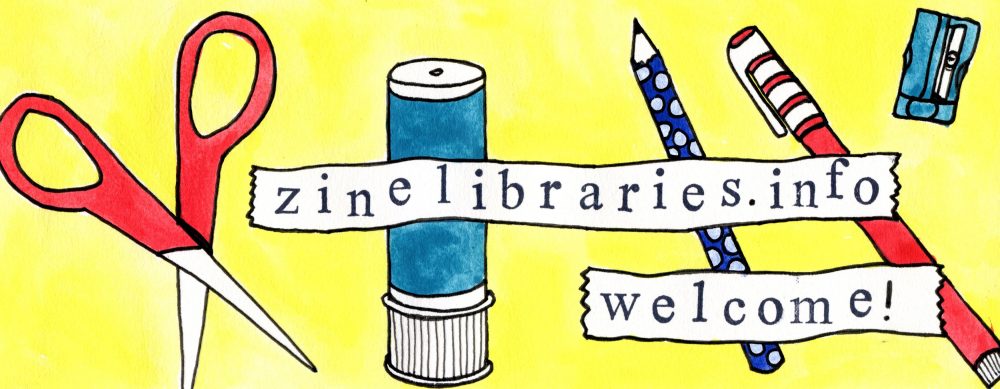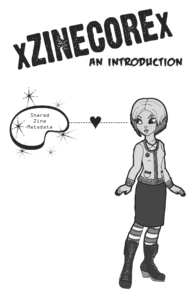If you’re reading this you may want to check Zine Cataloging Adventures – Pt. The First for background
OK, so I got the Koha box turned hooked up and turned on. It’s sitting on our local network at home behind a firewall for the momen. On first run, after it booted all the way, I logged in using the Root (god-like admin) account. After retreiving the passwords for the Koha admin account, I noticed that it (the Linux OS side of things) was acting a little goofy. Everything seemed to be up and running, though, so I ignored it for the time being.
Step 1 : Logging in to Koha
One of the great things about Koha is that it’s all web-based. Since I’m not a real librarian I don’t have anything to compare it to. I do know that in addition to Linux, Koha will run on Windows and Macintosh systems. I don’t think it will make coffee or donuts, though.
To login, I pointed my web browser at Koha’s IP address. The general (whole world) address is on the typical port for Apache (the web server software), 80. The Koha administrative interface, which is what the admins, and ultimately volunteer librarians will use is port 8080. So from Firefox I went to http://koha.qzap.org:8080 (not the real web address… YET)
I was presented with a very simple box with a place to put in Cardnumber (user name) and Password. Once I logged in, I got to the main screen.
Setting Up Koha
At this point I began to follow Koha – A Newbie Guide from the kohadocs website. You can (and maybe should) follow along in a seperate window or browser tab to see what I’m talking about.
I followed the Newbie guide closely, going through the set-up procedures. I skipped a couple of steps because right now they just don’t apply to us.
Item Types
When I got to “Item Types” in the guide, here’s what I set up:
Code (Koha requires up to 4 character codes for the item types. As I’ve discovered, this coresponds to 942c in the MARC records, and is very important later on)
CAS Audio Casette
CD – Audio Compact Disc
CMIX Comix – Zine Type, Self Published
DVD DVD Video Disc
FIC Book – Fiction
GNVL Book – Graphic Novel
MAG Magazine – *NOT* Self Published
NCSC Non-Circulating Special Collection
NFIC Book – Non-Fiction
PEPH Ephemera (mostly print) inc. flyers, posters, etc.
VHS VHS Video Casette No 0.00
VYNL Vinyl Audio Recording – Phonographic Recording
ZINE Zine – Self Published
(I copied this list from Koha… sorry that the formatting is bleah 🙁 )
In the process I was able to specify things like rental charges or if something was non-circulating. I didn’t put in charges, but specified that NCSC (Non-Circulating Special Collection) and PEPH (print ephemera) were not for loan. Because of the nature of our collection, we have flyers, buttons, stickers, etc. that we preserve and archive. I thought that they should stay in the building. Our patrons will have access to them, but not take them home.
Borrower Catagories
The next section in the Newbie Guide is “Borrower Catagories.” Koha, for better or worse forces two catagories on you. I had to set up a “Children’s” catagory and an “Institutions” catagory. All told, I set up 5 catagories:
C – Childrens
I – Institutions
P – Patron (Just about everybody)
V – Volunteers (self explanitory)
CC – Core Collective (the core group of people making decisions about the library)
Everyone at set up got the same basic paramaters… Children are the exception, and I don’t anticipate a lot of “children” using the zine library, at least not at first.
Enrollment – 18 years
Enrollment Fee – Zero Bux
Age Required – 10 years old (except Institutions. they’ve got to be at least 18 😉 )
Issuing Rules
After Borrower Catagories is Issuing Rules. This was a huge pain in the ass. Basically, you have to set up check-out times, overdue fees, grace periods, etc. for each item type and borrower catagory. It’s a huge messy grid, and it took a little while for me to understand it.
At the end of the day, almost everyone gets to check out materials for 14 days. After that, there’s a 7 day grace period, and then the fines start at 25¢ a day. Patrons can also renew materials 3 times. The exceptions: Institutions get to check stuff out for 45 days, and the overdue fines are$1.00.
MARC Stuff
I’ll go into details about getting MARC records set up in Pt. The Third. Because I’m not a real librarian, this is a lot of gobbledygook to me that I’ve got a couple of real librarians helping me with. If you’re a cataloger, or have lots of expirience with this, please chime in in the comments.
See you in Zine Cataloging Adventures – The MARC of Dooooom!
 While updating the Zines for Kids page here at zinelibraries.info someone recommended Sasaki Family Zines “Antifa For Kids“, published by Just Seeds.
While updating the Zines for Kids page here at zinelibraries.info someone recommended Sasaki Family Zines “Antifa For Kids“, published by Just Seeds.



